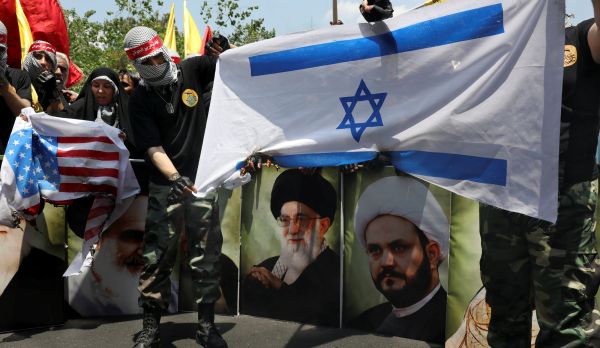Analysis/Why Iran Is Risking a Major Escalation With Israel
انشيل فايفر/هآرتس: لماذا تخاطر إيران بتصعيد كبير مع إسرائيل
Anshel Pfeffer/Haaretz/August 26/2019
Israel prevented the Iranians from building bases from which to launch attacks against it. But it failed to dislodge them from Syria – and Putin plans to keep it that way.
The Iranian plan to launch a swarm of “killer drones” toward Israeli targets from Syria, which was foiled by the Israel Defense Forces on Saturday night, was not exactly unprecedented.
In the last nineteen months, there have been at least four attempts by Iran, or militias working on its behalf, to launch either attack drones or missiles towards Israel, starting with the UAV shot down by an Israeli Apache helicopter moments after it crossed the border in February 2018.
What is different in this latest escalation is that the level of preparation by the Iranians seems higher than in the past. The decision taken by the high command of Iran’s Islamic Revolutionary Guards to launch the attack can be directly linked to its desire to retaliate reported airstrikes by Israel against Iranian-backed militias in Iraq.
What is also new is the swiftness of Israel’s acknowledgement of these particular strikes, both in detailed briefings by the IDF Spokesperson’s Unit and in simultaneous statements from Prime Minister Benjamin Netanyahu. While most unclaimed attacks were targeted at future threats, the IDF said that the latest strike prevented an immediate attack on Israel.
And of course, there is also the perhaps coincidental fact Netanyahu is facing a crucial election in three weeks (before the April election, he displayed similar willingness to claim strikes in Syria).
Despite its sworn enmity of the Jewish state for nearly four decades, the Islamic revolutionary leadership of Iran avoided direct military confrontation with Israel; instead, it used its various proxies.
The strategic shift from February 2018, toward active participation of IRGC’s al-Quds Force in the attacks, is a result of several factors, some springing from internal Iranian politics and the desire to score propaganda victories. Had some of the drones succeeded in targeting Israel, the damage would have been relatively minor, as they can only carry a few kilograms of explosives. But the effect on both Israeli and Iranian public consciousness would have been enormous.
Another reason for the IRGC’s willingness to take higher risk and commit to a major escalation with Israel is their frustration at Israel’s successful interdiction of their plan to establish permanent military presence in Syria, including the threat posed by such presence to Israel’s heartland. Israel has achieved considerable success – both on an intelligence level in detecting Iran’s attempts and operationally in attacking and destroying Iranian assets in Syria in hundreds of strikes, most of which have remained unacknowledged. But it should remain in perspective as well.
Israel has succeeded in foiling Iranian attack plans and preventing the establishment of long-term bases on Syrian soil, but it has fallen short on the overarching goal of ending all Iranian military presence in the country. This was to be achieved partly through pressure from Russia (and the United States), but as Russian President Vladimir Putin has shown, he is playing a much more complicated game in Syria.
Since Russia’s deployment to Syria, it has partnered with Iran in propping up the regime of Bashar al-Assad. At the same time, it hasn’t acted to block Israel from attacking Iranian assets there. The undeclared pact between Netanyahu and Putin is that Israel can go after Iran’s offensive capacities when these threaten Israel.
But the forces amassed by Iran in Syria – mainly Hezbollah fighters and Shi’ite Afghan, Iraqi and Pakistani militia-members, trained in Iran – have remained untouched. Russia wants Shi’ite boots on the ground, so that it doesn’t have to risk too many of its own soldiers. In other words, Iran has produced the cannon-fodder.
At various points during the war in Syria, since the original uprising broke out in 2011, there have been those within the Israeli security establishment who called for attacks on the Assad regime forces who killed hundreds of thousands and uprooted millions of Syrian civilians. Netanyahu intentionally limited the scope of Israel’s operations in Syria, striking only targets which could potentially pose a direct threat to Israel. This policy became even more rigid once Russian forces arrived in Syria.
Essentially, Israel and Iran are at a stalemate in Syria. Iran has kept Assad in power, but its plans to turn Syria into another base for its proxy operations – as it has done in Lebanon, Iraq and Yemen – have been foiled so far. And yet, there are tens of thousands of Shi’ite fighters in Syria, under Iran’s direct control. As proven by the events of Saturday night, they will continue trying to use Syria as a launching pad for attacks on Israel.






















